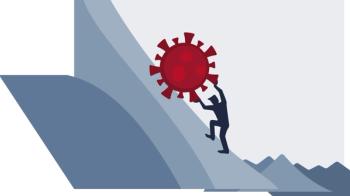
- Vol 38, Issue 9
From Languishing to Flourishing: The Impact of the COVID-19 Pandemic
What can be done to mitigate stress and reduce burnout?
The COVID-19 virus has strained the capacities of health care systems around the world. According to the
Under Pressure
Many scientific studies have evaluated the psychological impact of the COVID-19 pandemic on health care providers and found significant psychological distress.2,5-7 Specifically,
Notably, very few studies have evaluated the impact of the COVID-19 pandemic on the mental health and well-being of psychiatrists. In a recent
The lack of research on this subject is surprising. Results of many studies have confirmed the negative impact of COVID-19 on the mental health of the general public.10-15 For example, a
Psychiatric Symptoms
Studies conducted prior to the COVID-19 pandemic have shown that mental health professionals, including psychiatrists, experience high rates of burnout and stress.16-18 In addition to the stressors experienced by all physicians, psychiatrists face unique challenges, including treating patients who are aggressive and suicidal and the need to stay keenly attuned to their patients’ emotional states.18 A study by
Contributing to physician burnout is a loss of sense of control and autonomy in the workplace. From an organizational perspective, this challenge can be met through shared decision-making between leadership and health care workers, including codesign methods.19,20 Many studies have shown the positive impact of developing better coping and stress-management strategies.19,21,22 A systematic review by Ruotsalainen et al21 evaluated the effectiveness of person-directed interventions to decrease occupational stress in health care workers. Techniques that were effective for mitigating occupational stress included cognitive behavioral therapy (CBT), physical relaxation (eg, massage), and mental relaxation (eg, meditation).21
Another factor contributing to physician and health care worker burnout and stress is loss of meaning in work. Health care organizations can mitigate this by promoting shared core values, promoting physician communities, and offering training around physician burnout.19,23 From an individual perspective, health care workers can practice mindfulness and engage in small-group activities to discuss shared work experiences.
In another study, qualitative interviews with mental health workers revealed that they experienced increased feelings of grief, helplessness, and distress.24 These feelings were due in part to moral injury, a sense that they had failed to provide quality care to their patients as a result of limited health care resources available throughout the pandemic.
Residents in psychiatry and medical students have also experienced negative psychological symptoms associated with the COVID-19 pandemic. A study by Lasheras et al25 found a high prevalence (28%) of anxiety among medical students throughout the pandemic. Furthermore, a study in Saudi Arabia found a high prevalence of burnout and depression symptoms in psychiatry residents, with 26.4% of psychiatry residents noting high emotional exhaustion, 10.7% meeting criteria for high depersonalization, and 24.0% demonstrating low personal accomplishment.26
Lifting the Burden
The time has come to implement strategies that can mitigate the burden on psychiatrists and other mental health professionals. Studies have shown the efficacy of both individually catered and organizationally driven solutions.19,21,22 Several possible initiatives are outlined in the
Unfortunately, as the COVID-19 pandemic has placed significant burdens on health care systems, resources have often been redistributed away from mental health fields due to financial constraints.2 One way our system can support psychiatrists is to increase health care resources and adequately meet the increasing demand. This could allow for a greater number of mental health workers, which would decrease the burden on existing mental health staff by reducing their workload.19 Additionally, it could lead to increased efficiencies in the workplace environment and reduce stress. It is also important for psychiatrists and other mental health care workers to support their colleagues, look for signs of trouble, and follow up appropriately.
Concluding Thoughts
As a result of the pandemic, the general population has seen a rise in mental health challenges.10-15 This has placed greater demands on psychiatrists, both with regard to their workload and to emotional stress in the workplace.13 Yet limited research has been conducted evaluating the impact of the COVID-19 pandemic on the mental health and well-being of psychiatrists and other mental health professionals.
Organizations and individual health care workers should implement strategies to mitigate occupational stress and burnout.19,21,22 For organizations, strategies could include appropriate resource allocation, shared decision-making, and wellness training programs. For individual health care workers, strategies such as outlining specific goals, CBT, and mental and physical relaxation should be adopted. Indeed, mitigating the occupational stress and burnout experienced throughout the pandemic should be viewed as a joint responsibility of both health care organizations and individual health care workers.27,28
Ms Uhlman is an MD candidate at Michael G. DeGroote School of Medicine in Hamilton, Ontario, and a former practice facilitator at South West Local Health Integration Network. Dr Amaladoss is an assistant clinical professor in the Department of Psychiatry and Behavioral Neurosciences of McMaster University and consultant psychiatrist at the Advanced Mind Clinic ADHD and Anxiety Centre. Dr Lentz is an assistant clinical professor in the Department of Psychiatry and Behavioral Neurosciences and psychiatry clerkship director at McMaster University.
References
1. WHO coronavirus (COVID-19) dashboard. World Health Organization. Accessed July 27, 2021.
2. Luo M, Guo L, Yu M, et al.
3. Allsopp K, Brewin CR, Barrett A, et al. Responding to mental health needs after terror attacks. BMJ. 2019;366:I4828.
4. Berger W, Coutinho ES, Figueira I, et al. Rescuers at risk: a systematic review and meta-regression analysis of the worldwide current prevalence and correlates of PTSD in rescue workers. Soc Psychiatry Psychiatr Epidemiol. 2012;47(6):1001-1011.
5. Sarwar MAA, Sarwar H. The impact of COVID-19 on the mental health of healthcare professionals. J Coll Physicians Surg Pak. 2020;30(6):83.
6. Carmassi C, Foghi C, Dell’Oste V, et al. PTSD symptoms in healthcare workers facing the three coronavirus outbreaks: what can we expect after the COVID-19 pandemic. Psychiatry Res. 2020;292:
113312.
7. Preti E, Di Mattei V, Perego G, et al. The psychological impact of epidemic and pandemic outbreaks on healthcare workers: rapid review of the evidence. Curr Psychiatry Rep. 2020;22(8):43.
8. Fiest KM, Parsons Leigh J, Krewulak KD, et al. Experiences and management of physician psychological symptoms during infectious disease outbreaks: a rapid review. BMC Psychiatry. 2021;21(1):91.
9. Bohlken J, Schömig F, Seehagen T, et al. Experience of practice-based psychiatrists and neurologists during the COVID-19 pandemic. Article in German. Psychiatr Prax. 2020;47(4):214-217.
10. Golechha M. COVID-19, India, lockdown and psychosocial challenges: what next? Int J Soc Psychiatry. 2020;66(8):830-832.
11. Mukhtar S. Psychological health during the coronavirus disease 2019 pandemic outbreak. Int J Soc Psychiatry. 2020;66(5):512-516.
12. Ng QX, Chee KT, De Deyn MLZQ, Chua Z. Staying connected during the COVID-19 pandemic. Int J Soc Psychiatry. 2020;66(5):519-520.
13. Torales J, O’Higgins M, Castaldelli-Maia JM, Ventriglio A. The outbreak of COVID-19 coronavirus and its impact on global mental health. Int J Soc Psychiatry. 2020;66(4):317-320.
14. Singh S, Roy D, Sinha K, et al. Impact of COVID-19 and lockdown on mental health of children and adolescents: a narrative review with recommendations. Psychiatry Res. 2020;293:113429.
15. Heitzman J. Impact of COVID-19 pandemic on mental health. Psychiatr Pol. 2020;54(2):187-198.
16. Zeng L-N, Lok K-I, An F-R, et al. The prevalence of burnout and its associations with demographic correlates and quality of life among psychiatric nurses in China. Psychiatr Q. 2021;92(2):645-653.
17. Hardy P, Costemale-Lacoste J-F, Trichard C, et al. Comparison of burnout, anxiety and depressive syndromes in hospital psychiatrists and other physicians: results from the ESTEM study. Psychiatry Res. 2020;284:112662.
18. Rotstein S, Hudaib A-R, Facey A, Kulkarni J. Psychiatrist burnout: a meta-analysis of Maslach Burnout Inventory means. Australas Psychiatry. 2019;27(3):249-254.
19. West CP, Dyrbye LN, Shanafelt TD. Physician burnout: contributors, consequences and solutions. J Intern Med. 2018;283(6):516-529.
20. Kitch T. A leadership perspective on a shared vision for healthcare. Nurs Leadersh (Tor Ont). 2017;30(1):30-32.
21. Marine A, Ruotsalainen J, Serra C, Verbeek J. Preventing occupational stress in healthcare workers. Cochrane Database Syst Rev. 2006;(4):CD002892.
22. Regehr C, Glancy D, Pitts A, LeBlanc VR. Interventions to reduce the consequences of stress in physicians: a review and meta-analysis. J Nerv Ment Dis. 2014;202(5):353-359.
23. Hargett CW, Doty JP, Hauck JN, et al. Developing a model for effective leadership in healthcare: a concept mapping approach. J Healthc Leadersh. 2017;9:69-78.
24. Yu Moutier C, Myers MF, Breen Feist J, et al. Preventing clinician suicide: a call to action during the COVID-19 pandemic and beyond. Acad Med. 2021;96(5):624-628.
25. Lasheras I, Gracia-García P, Lipnicki DM, et al. Prevalence of anxiety in medical students during the COVID-19 pandemic: a rapid systematic review with meta-analysis. Int J Environ Res Public Health. 2020;17(18):6603.
26. Alkhamees AA, Assiri H, Alharbi HY, et al. Burnout and depression among psychiatry residents during COVID-19 pandemic. Hum Resour Health. 2021;19(1):46.
27. Wallace JE, Lemaire JB, Ghali WA. Physician wellness: a missing quality indicator. Lancet. 2009;374(9702):1714-1721.
28. Shanafelt TD, Noseworthy JH. Executive leadership and physician well-being: nine organizational strategies to promote engagement and reduce burnout. Mayo Clin Proc. 2017;92(1):129-146. ❒
Articles in this issue
over 4 years ago
What Do I Do Now? Making Decisions in a Postpandemic Worldover 4 years ago
A Generation in Crisis?over 4 years ago
Treating Mania in Older Adults With Bipolar Disorderover 4 years ago
Inclusivity: Ensuring Patients Who Are Plus-Size Feel Welcomeover 4 years ago
Art Imitating Life: A Poet’s Wordsover 4 years ago
Fraternity Paddleover 4 years ago
Harnessing Harm-Reduction Methods to Combat the Opioid CrisisNewsletter
Receive trusted psychiatric news, expert analysis, and clinical insights — subscribe today to support your practice and your patients.







